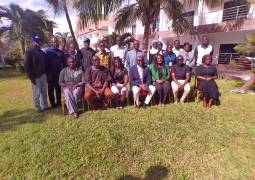
The event, which began in Kerewan, targeted 30 heads of horticulture gardens in the North Bank, Central River north and south, Lower River and West Coast Regions.
The WACOMP project is aimed at increasing The Gambia’s competitiveness through enhanced quality compliance along the onion value chain by improving the performance, growth and contribution to industry, regional trade and exports of onion and other horticulture value chain.
Funded by the European Union (EU), WACOMP-GM is implemented by the United Nation Industrial Development Organization (UNIDO).
“In line with the project’s aim to raise awareness and provide training on quality and standards, the regional workshops will develop the capacities of horticulture producers on market requirements of the onion and allied value chains,” stated Mr. Malamin Drammeh, a national Horticulture Value Chin expert.
Drammeh said WACOMP-GM is increasing its performance along the onion value chain regarding food safety and quality compliance.
The project, he added, is strengthening technical capacities of The Gambia Standard Bureau (TGSB), Food Safety and Quality Authority (FSQA) and other relevant entities of the National Quality Institutions (NQI) to provide relevant services needed by the onion and allied value chains.
A representative of the Regional Agricultural Directorate-NBR, Mr. Omar Sonko, described the training as ‘very significant and timely.’
The training, he said, would significantly contribute to the improvement of the quality of onions produced in the gardens.
This, he said, would increase the knowledge and skills of the garden members in meeting market expectations.
“The rationale for the training is because until now, onions are produced and handled without any due regard to what the market requires. Onions are harvested in bulk without sorting, grading, weighting and are bagged and sent to the market whiles the market requirements call for produce that are graded and standardised in terms of weight and use of proper onion bags,” Sonko stressed, adding that the training seeks to address these challenges.
He thus thanked the European Union for funding the project and UNIDO for its implementation.
“Because of their high perishability, seasonality and bulkiness, horticultural crops require special care and attention in meeting the market requirements,” said Mahmoud Touray, the facilitator of the training workshops.
Read Other Articles In National News
Lack of positive protection hurts girls, communities
Sep 6, 2022, 11:39 AM




